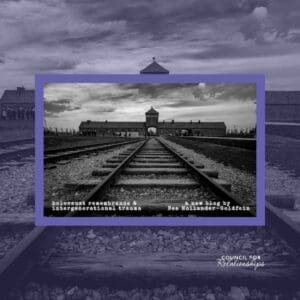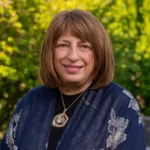Holocaust Remembrance & the Legacy of Intergenerational Trauma
The government of Israel established Yom HaShoah as a day of Holocaust remembrance to honor the six million Jews and five million others who perished in the Holocaust—an event whose legacy of intergenerational trauma continues to shape survivors’ families today. The Israeli Parliament passed a law in 1953 to inaugurate Yom HaShoah as a public day of remembrance. Communities around the world, Jewish and non-Jewish, observe Yom HaShoah to memorialize this genocidal catastrophe.
The Power of Holocaust Remembrance: Why We Reflect and Remember
History books and films document the events of WWII in addition to the recording of firsthand testimonies documenting the experiences of those Jews who survived the war. The United States Holocaust Memorial Museum in Washington, D.C., along with numerous other sites, archives these testimonies. Yad Vashem, the Holocaust Memorial Museum in Israel, is an international repository of survivor oral histories. These archival sites allow access to these historical accounts in person or online.
Preserving the Past: Museums, Memory, and Testimony
In addition to public archives, CFR offers unique access to the Transcending Trauma Project—an in-depth repository of psychological narratives collected over decades. As part of an extensive research project seeking to record the historical events and the deeply experienced psychological impacts of the Holocaust, interviews that document the deeply experienced psychological and emotional experiences of survivors and the impact on their children and grandchildren are available to all CFR staff for review as audiotaped interviews or transcribed documents.
The Transcending Trauma Project provides this through its extensive research efforts. These resources are extensive and available to all who are interested in knowing about these overwhelmingly compelling historical events. We must acknowledge the truth: those who do not know their history are compelled to relive it.
Holocaust Education and Intergenerational Trauma in Communities Today
Holocaust education is common in the Jewish community, synagogues, and schools. Public ceremonies that commemorate the Holocaust will typically include survivors who share their experiences with large community audiences.
Holocaust education is offered in American Universities, and many public school systems around the country now require a Holocaust unit of study, including the Philadelphia School District. Gratz College hosts the largest graduate program in Holocaust and Genocide Studies, offering a Master’s Degree and a Doctorate. Through this online program, hundreds of graduate students from around the world are engaged in the study of the Holocaust and other genocidal events.
From public ceremonies to graduate studies, Holocaust education takes many forms. Each contributes to Holocaust remembrance and helps deepen understanding of intergenerational trauma passed down through survivors’ families.
Honoring Courage: Stories of Resistance During the Holocaust
While education helps us understand what happened, it’s also important to remember those who acted with extraordinary bravery. Amid the darkness, individuals risked everything to protect and save others—often at great personal cost. These stories remind us of what moral courage looks like in action.
- Ho Feng-Shan, Chinese diplomat: Issued visas against orders, saving thousands of Jews
- Chiune Sugihara, Japanese diplomat: Issued visas saving thousands of Jews
- Jose Castellanos Contreras, Salvadoran: Saved 40,000 Jews
- Elsa Holzer, German: Led the protest of wives for their Jewish husbands
- Oskar Schindler, German: Saved 1,200 Jews in his factory
- Irena Sendler, Polish: Smuggled 2,500 children from the Warsaw Ghetto
- Raoul Wallenberg, Swedish: Issued protective passports saving thousands of Jews
- Carl Lutz, Swiss: Helped 62,000 Jews escape Hungary
- Miep Geis, Dutch: Hid Anne Frank and her family
- Magda Trocme, French: Led her village to hide 5,000 Jews
What We Learn From Holocaust Remembrance and Intergenerational Trauma
Why study history? Learning about the potential for evil in human society is essential, especially in light of history’s horrors. We must learn to be diligent in our response to events in society.
But, even more important is how our hearts open to a compassionate response when we learn about human suffering. Holocaust education for high school groups was intended to enable teenagers to learn compassion and a commitment to care about humanity. Research on special programs for Black students resulted in greater human compassion after the Holocaust program.
But even more important, within these groups, the teenagers experienced increased compassion for their difficulties within a society still manifesting racism. How long did this increased compassion last? We don’t know – the assumption was that the experience would be sensitizing over time. But what we don’t see in today’s world is the ongoing commitment to human compassion, whatever the group, whatever the hardships.
Research shows that current surveys reveal less knowledge of the Holocaust. Uh oh! How will we prevent the repetition of history if we don’t know it? The number of antisemitic incidents has quadrupled in the past year. Why? Why is hate on the rise?
Well, we are at a time in history that should serve as a wake-up call. Compassion alone is no longer sufficient. We need to move towards the imperative of personal responsibility. The imperative is to act in response to human suffering.
We face a strong imperative to act in response to changing societal perspectives that are less oriented to concerns for the individual. More people experience beliefs and attitudes as part of their identity, which leads to offense when opinions differ. People are more close-minded. References are made to us vs. them instead of statements of common interest.
From Global Conflict to Personal Pain: How Intergenerational Trauma Manifests in Therapy
Motivated by realities in the world that include the war between Ukraine and Russia and the war between Israel and Hamas. Realities that include famine and atrocities experienced by civilians in Sudan and other conflicts in the world.
What about the struggles in your family and conflicts with friends? Family members are not speaking to each other because of how they voted in the last election! This is unbelievable.
FACT – April 15, 2025. An arsonist sets fire to the Pennsylvania state capital residence occupied by Governor Josh Shapiro and his family. At 2 AM, the family is awakened by the police and firefighters to leave the house immediately due to the threat to their lives. The arsonist stated that he had firebombed the state residence out of rage against Shapiro’s sentiments about Israel. How does this make you feel? Sad, uncomfortable, concerned, angry, scared, motivated?
These global and local events don’t just shape history, but also how people feel and function daily. At CFR, we see the psychological toll of intergenerational trauma every day, especially as clients navigate fear, anxiety, and unresolved pain from past generational experiences.
What does all of this mean for mental health? My therapist colleagues and I have experienced a general increase in clients talking about anxieties and fears related to events in the world and changing realities in the US.
These are not anxieties that anyone can do anything about. Therefore, in therapy, this is not about problem solving or changing reality; it is about coping and adaptation so that we can deal with a changing world without debilitating fear and anxiety.
For some, the experience of anxiety can trigger the re-experiencing of unresolved psychological states related to past difficulties. Clients don’t even recognize the source of these deeper fears until there is the opportunity to explore their origins in therapy.
Triggers, Transmission, and the Legacy of Trauma
There is an even greater threat to one’s well-being if current realities are traumatic in nature and trigger the unresolved emotional responses to past traumatic personal, familial, or communal events. The reality of the intergenerational transmission of trauma speaks to how parental or familial traumatic experiences impact children and grandchildren.
Often, individuals are unaware of the impact of historical trauma until they experience troubling reactions and need to explore their family histories to understand the source. Ongoing experiences of discrimination, racism, financial instability, and violence can deepen intergenerational trauma and leave individuals and families more vulnerable to external stressors and fear.
At this time of Holocaust remembrance, we should acknowledge how current events have re-triggered feelings related to the Holocaust for survivors and their descendants. Many survivors reported extreme anxiety and emotional vulnerability to the news of the brutal assault on Israelis on October 7.
Children of survivors report sensitivity to the upsurge in antisemitism, with images of pre-war Germany. Antisemitic rhetoric that has characterized some campus protests against the Israel-Hamas War has included statements advocating for death to the Jews. Not only is this frightening in and of itself, but it triggers emotional reactions that are intensified by the past.
In the spirit of Holocaust remembrance, we must ask: what can we do? Our wounds can become the source of wisdom. Open your heart to the painful experiences of others. Open your heart to your own challenges. Feel compassion for others that goes beyond specific hardship or group.
See the challenges as “we” – not us or them. And if the hatred occurs within your sphere of life, then do something about it. Only then can we say that we have learned from the past and we are working for a better future.
Editor’s Note: The views expressed in this blog are those of the author and do not necessarily reflect the official policy or position of Council for Relationships.
Continue Learning and Taking Action
About the Transcending Trauma Project & the Study of Intergenerational Trauma
The Transcending Trauma Project, led by Council for Relationships, is a multi-decade oral history research initiative documenting the long-term impact of the Holocaust on survivors and their families. These powerful testimonies offer insight into how intergenerational trauma is transmitted—and how people find meaning and healing in its aftermath.
Support this essential work of Holocaust remembrance. Your donation helps preserve these stories for future generations.
Donate to the Transcending Trauma Project
About the Author
Bea Hollander-Goldfein, PhD, LMFT, CCTP, APIT, is Director of the Transcending Trauma Project at Council for Relationships, where she also serves as a Staff Therapist. Dr. Hollander-Goldfein specializes in intergenerational trauma, grief, and systemic family therapy. She is currently accepting new therapy clients.
Want to work with Dr. Hollander-Goldfein?
More from CFR
Council for Relationships is a nonprofit organization with over 80 therapists and psychiatrists across Pennsylvania and New Jersey. Whether you’re navigating intergenerational trauma, seeking support for anxiety, or exploring relationship dynamics, our clinicians are here to help.
- Get matched with a CFR therapist who meets your needs
- Sign up for our newsletter for mental health tips, updates, and events
- Explore more blogs on trauma, healing, and Holocaust remembrance


